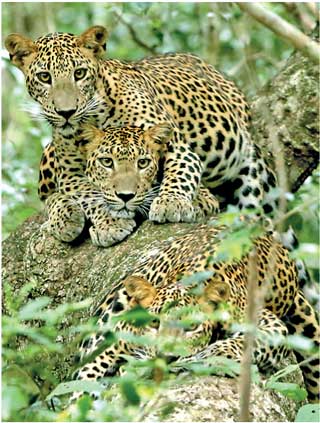Sunday Feb 22, 2026
Sunday Feb 22, 2026
Thursday, 11 August 2022 00:00 - - {{hitsCtrl.values.hits}}


The Wildlife and Nature Protection Society monthly lecture on 18 August will put spotlight on the conservation of the Sri Lankan leopard.
The event at 6 p.m. at the Jasmine Hall, BMICH will share key insights from Prof. Enoka Kudavidanage,
 |
| Leopards of Wilpattu Image by Kithsiri Gunawardena |
Rukshan Jayewardene and Kithsiri Gunawardena. It will be moderated by Sriyan de Silva Wijeyeratne.
WNPS said at the beginning of the 1900s, it was estimated that there were 1,600 wild leopards in Sri Lanka. It is uncertain as to the accuracy of this claim, or the scientific basis for the research that led to this figure being determined. It was probably more of a ‘guesstimate’, based on the accumulated knowledge at that time.
Even today, we have to rely on such guesstimates as, to date, no comprehensive scientific survey has been conducted, island-wide, to establish a definitive number. These estimates vary between 800 and 1,000, for the entire country. As such, it is difficult to make accurate assessment of whether their number has increased or decreased with time.
What is certain, however, based on the intensive research that has been conducted in recent times, in protected areas and their surrounds, is that the number of confirmed leopard deaths has been on the increase. 41 were killed in last five years, mostly upcountry, and a number have already died this year. Where once leopards were killed for their beautiful pelts, there is evidence to suggest that they are being increasingly targeted for their teeth and claws; as substitutes for tiger claws in the aphrodisiac and sorcery trades. In addition, and most perilous to this already endangered species, is the loss of their natural habitat due to illegal human encroachment. Inevitably, this results in the reduction of the prey species that also inhabit these areas.
The leopards, then, enter human habitation in search of food and are killed in the most horrendous ways – snares, trap guns, poisons, et al. – often in agony for many hours and days before death releases them. There is a mistaken belief, amongst some, that the population of leopards is increasing. In fact, it is just that they have become more visible, drawn towards human settlements in search of food.
It is essential that Sri Lanka’s apex predator, the leopard, is conserved with strategies based on good science. The continued survival of the interconnected community, of which it is a vital component, depends on it too.
Prof. Enoka Kudavidanage, Rukshan Jayewardene, and Kithsiri Gunawardena are acknowledged, as some of the three best ‘brains’ on leopard behaviour, and on the pressures for their conservation. The WNPS is privileged to have their services on a panel discussion to discuss the present status of the wild leopard, and of the measures necessary for their future conservation. The discussion will be moderated by Sriyan de Silva Wijeyeratne.
The monthly lecture of the WNPS is supported by the Nations Trust Bank. It is open to both members and non-members, Entrance Free. It will be available on both Zoom and FB live as well.
Prof. Enoka P. Kudavidanage is a Professor in Conservation Biology, affiliated with the Sabaragamuwa University of Sri Lanka since 2001. She completed her B.Sc. honours in Zoology and M.Sc. in Environmental Sciences at the Department of Zoology, University of Colombo, and Ph.D. at the Department of Biological Sciences, the National University of Singapore in 2012.
Her research areas include Wildlife Crime Mitigation, Ecology, and Conservation of the Sri Lankan Leopard, Protected Area Management, and Utilizing Biological Indicators to monitor the Impacts of Land-use change and Community-level impacts of Agro-Chemicals.
Rukshan Jayewardene A founding trustee at the Leopard Trust; Chairman of the Wilderness and Protected Areas Foundation, former Director at the Environmental Foundation Ltd. (EFL) and past President of the WNPS.
Kithsiri Gunawardena: There is perhaps none, since the end of the War, that has learned more about Wilpattu than Kithsiri Gunawardena. A renowned ornithologist in his own right, his love of Wilpattu extends beyond the more popular species to its lepidoptera, and to all other creatures great and small.
Sriyan de Silva Wijeyeratne is a former President of the WNPS and currently Chairman of PLANT.